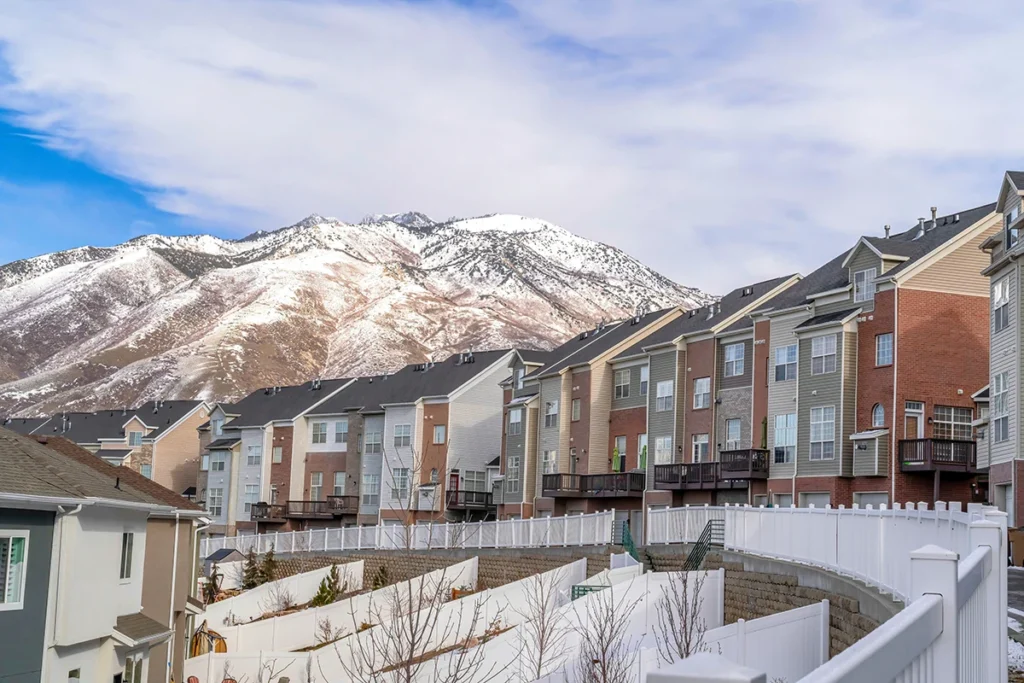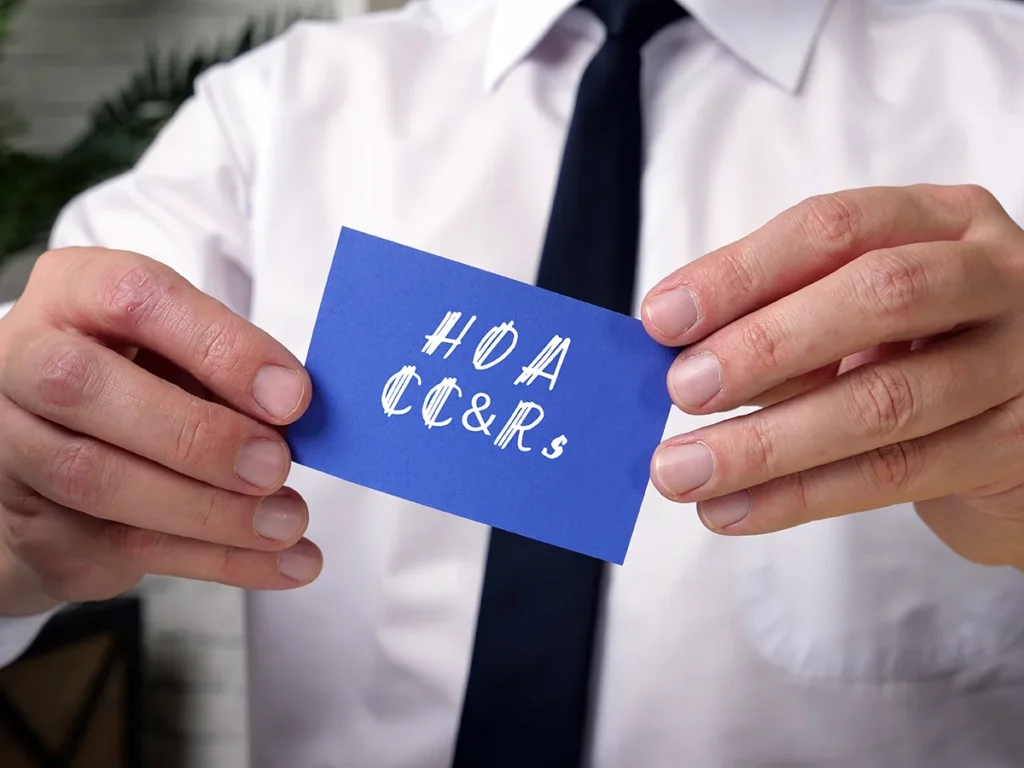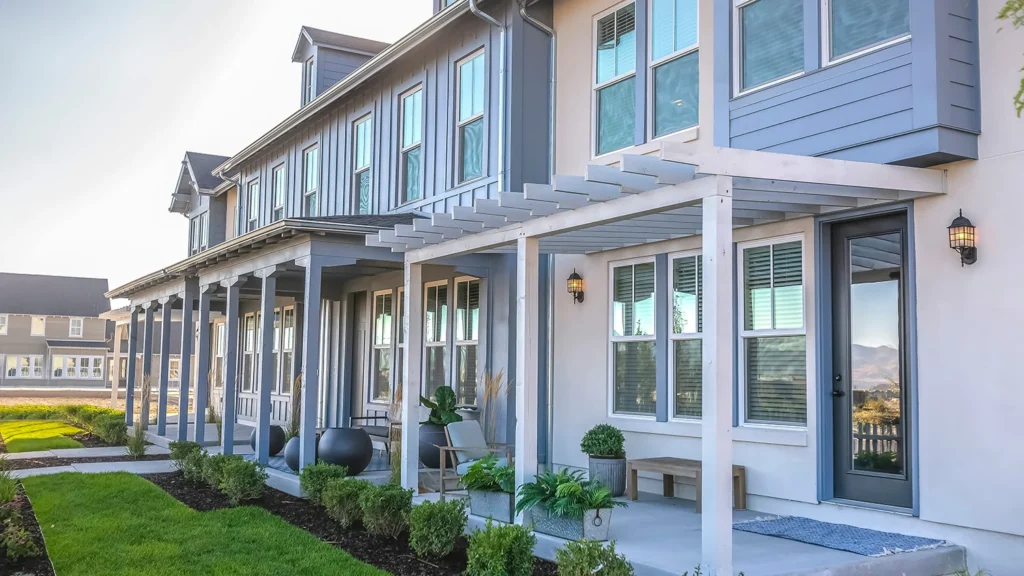For owners of single-family homes, townhomes, and condos within a Homeowners Association, the rental business comes with a complex, often frustrating extra layer of compliance. You’re not just a landlord dealing with a standard lease; you’re also the ultimate guarantor for your tenants’ adherence to a second, often nitpicky, set of UTAH HOA laws for landlords. Commonly known as community rules, or as the CC&Rs (Covenants, Conditions & Restrictions).
Picture this: You own a single-family home in a beautiful HOA community in Salt Lake City. You’ve got a great tenant, and the rent is coming in on time. Everything seems perfect until an envelope arrives—not a rent check, but an HOA fine because your tenant’s recycling bin was left visible from the street on the wrong day.
This is the reality of managing a rental in an HOA in Utah. Success requires more than just collecting rent; it demands proactively integrating HOA rules for tenants into your lease agreement and management style. This is the only way to protect your investment from costly HOA fines and maintain a good standing with the community.

Utah HOA Laws for Landlords: The Owner is ALWAYS Responsible
This is the single most important concept any landlord with a rental property in an HOA must internalize: The HOA’s contract is with the property owner, not the tenant.
Understanding this principle is the foundation of protecting your bottom line.
Key Points on Property Owner Responsibility
- Legal Liability: In the eyes of the HOA and the governing Utah HOA laws for landlords, the property owner is the responsible party for every violation and subsequent HOA fine.
- No Contractual Relationship: Your tenant has a lease contract with you. They have no direct contractual agreement with the HOA. The HOA cannot directly fine your tenant or legally compel them to attend a board meeting or remedy a violation.
- Who is responsible for tenant HOA violations? The answer is unequivocally the property owner responsibility. Even if your tenant is the one who caused the issue, the notice, the fine, and the lien (in severe cases) will all come to you.
This means your management strategy must focus on creating an ironclad, enforceable agreement with your tenant that mirrors your own obligations to the HOA.
Your Lease is Your First Line of Defense Against Landlord HOA Issues
Since you are legally liable to the HOA for your tenant’s actions, your lease is the essential tool for transferring that liability—and the financial burden of fines—to the person actually causing the problem. This is where proactive property management is critical.

1. The Critical HOA Addendum
The most critical step in protecting yourself is integrating the HOA’s governing documents directly into your lease agreement.
- The Document: Create and utilize a comprehensive Lease addendum for HOA rules Utah, or an “HOA Rules Addendum,” for any rental property in an HOA.
- Tenant Acknowledgment: This addendum must require the tenant’s signature, explicitly stating they have received a full copy of the HOA’s rules, regulations, and CC&Rs. Furthermore, they must agree to abide by them as a mandatory condition of the lease.
- What to Include:
- The association’s name, contact information, and management company.
- A declaration that the tenant understands a violation of the HOA rules is a breach of the lease agreement.
- A clause granting the landlord the right to enter the property with appropriate notice to remedy an uncorrected HOA violation (e.g., bringing in the trash bins).
2. Passing Through Fines
Your addendum must clearly establish a mechanism for reimbursement so you aren’t stuck paying for your tenant’s mistakes.
- The Clause: Explicitly state that any HOA fines or fees levied against the property owner due to the tenant’s violation of the HOA rules will be passed on to the tenant and assessed as “additional rent.”
- Enforceability: By defining fines as additional rent, you leverage the established eviction and collection procedures for non-payment of rent, giving you a powerful, legal recourse should a tenant refuse to pay.
- Clarity is King: Specify the process—for example, the landlord will pay the HOA fine to avoid late fees or escalation, and then immediately bill the tenant. Provide a clear deadline for the tenant’s reimbursement.
This legal framework transforms the question, “Can an HOA fine a landlord for a tenant?” from a liability into a procedural issue, ensuring you can recover your costs.
Common Tenant-Caused HOA Violations in Utah
Utah HOA laws for landlords require you to be vigilant, as tenants often operate without the same sense of ownership or awareness of complex HOA community rules. Knowing the frequent violation hotspots helps you educate tenants upfront and conduct targeted inspections.
Top Categories of Common HOA Violations by Tenants
| Category | Description of Violation | Landlord’s Proactive Check |
| Parking Issues | Unauthorized long-term street parking, parking commercial vehicles, parking RVs or boats in driveways, or using reserved guest spots as permanent parking for extra vehicles. | Confirm vehicle registration and license plates with the HOA; clearly designate allowed parking spots in the lease. |
| Trash & Recycling Bins | Leaving bins visible from the street or in the driveway except on collection day, or putting trash out too early. | Provide a written, clear schedule for trash day and specify where bins must be stored (e.g., inside the garage). |
| Landscaping & Yard Maintenance | Failure to mow the lawn, excessive weeds, unkempt flower beds, or improper storage of items (e.g., toys, tools) in the yard. Townhome property management often includes exterior maintenance, but single-family homes rely heavily on the tenant. | Conduct regular property inspections that specifically check yard condition against HOA standards. |
| Property Alterations | Installing a trampoline, painting the front door, putting up unapproved holiday decorations, or installing a satellite dish without prior architectural approval from the HOA. | Prohibit all exterior alterations in the lease without the landlord’s written pre-approval, and stipulate that all requests must go through you first. |
| Use of Amenities | Violating rules for the community pool, clubhouse, or gym, such as bringing too many guests or violating hours. | Review pool pass/key policies and ensure the tenant understands the rules regarding guests and noise. |
Every one of these common infractions can trigger a notice, a hearing, and ultimately, an unwelcome HOA fine directed straight at you.

The Solution: A Property Manager Deals With the Details and Mitigates the Risk
Navigating complex Utah HOA laws for landlords and mitigating the inherent risk of a rental property in HOA Salt Lake City is precisely where professional property management shines. An experienced property manager has the confidence and know-how to handle the details and any violations that come with having tenants in an HOA property.
How Property Management Optimizes Your HOA Rental
- Let Them Do the Homework: Before a property in an HOA community is listed, the team obtains and meticulously reviews the HOA’s governing documents, including all CC&Rs, bylaws, and current rules. An experienced HOA property manager identifies all restrictions on rentals, specific maintenance requirements, and the fine schedule.
- Ironclad Lease Documents: When your home is in an HOA, the lease documents need to include a comprehensive, legally sound addendum. This ensures the tenant is fully aware of, and contractually liable for, adherence to the rules and reimbursement of any assessed HOA fines.
- Tenant Onboarding and Education: During the move-in process, paperwork isn’t just handed over. Managers actively educate tenants on the most important and frequently violated community rules—especially regarding parking, trash, and noise—to set clear expectations from Day 1.
- Proactive Property Inspections: As with any property, regular property inspections are tailored to HOA compliance. No one should wait for a violation notice to arrive; the goal is to catch potential violations (like a weedy lawn or an unapproved item in the driveway) before the HOA’s property patrol ever sees them. This preventative approach saves you money on fines.
- HOA Liaison and Communication: A property manager acts as the sole point of contact with the HOA management company. They handle all formal communication, violation notices, and resolution procedures on your behalf, effectively insulating you from the administrative stress and back-and-forth.
For owners with townhome property management needs or single-family rentals in restricted communities, a proactive management style is the difference between stress and peace of mind.
Protect Your Investment with HOA Expertise
Owning a rental property within a Homeowners Association in Utah can be a highly lucrative investment, but the additional administrative layer and risk of unexpected HOA fines can quickly erase your profit and add immense frustration. From understanding Utah HOA laws for landlords to implementing the correct lease addendum, the successful management of an HOA rental hinges on proactive, rule-based operation.

You deserve a stress-free investment experience. A professional property manager who is intimately experienced with HOA community rules and their unique legal complexities is the best way to ensure your property remains compliant, your tenants are accountable, and your investment is protected.
Own a single-family or multi-unit rental? Contact Rhino Property Management to see how our specialized expertise can save you time and money, and turn your biggest liability into a well-managed asset.

